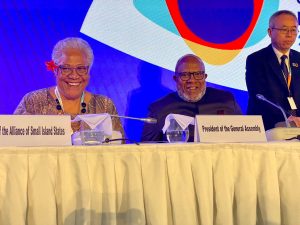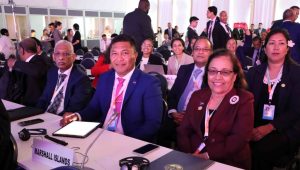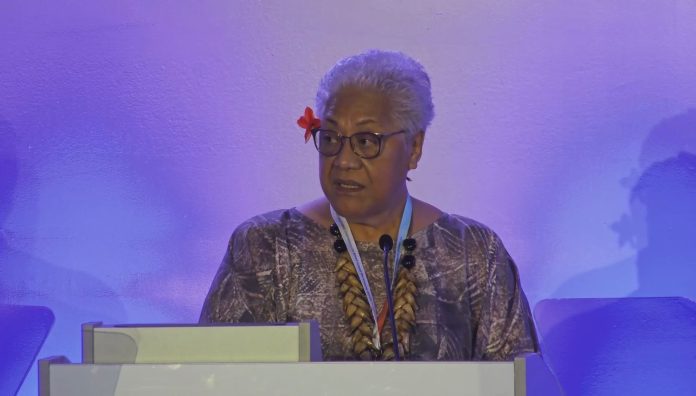At the Fourth International Conference on Small Island Developing States (SIDS4) in Antigua and Barbuda, Samoan Prime Minister Fiame Naomi Mata’afa, representing the Alliance of Small Island States (AOSIS), emphasised that while small island nations are defined by their vulnerability, they must not be limited by it.
Describing States such as hers as “the Davids amongst the Goliaths of the world”, she said for three decades the Alliance has advocated for global responses that make the world safer and more equitable for everyone.
“And they do this even when the global response to safeguarding their future against the climate emergency is tepid,” she said.
Small island States have consistently called for the appropriate response mechanisms in finance, adaptation and technology, she pointed out, noting that climate change scientists expect the global temperature to rise to at least 2.5°C above pre-industrial levels in this century, which will blast past the internationally agreed 1.5°C target.
“This is no time for cat and mouse games,” she said, stressing that large emitters must do all they can to reverse this trend. And while small island developing States need financial support to mitigate the impacts of climate change, “no amount of money can compensate for the destruction and utter devastation that our peoples and islands face”, she added.
Small island developing States are ready to work diligently with those who want to be part of the journey, she stressed, highlighting the need for 100 per cent renewable energy, debt reduction and technological innovation.
Calling for the reform of the international financial architecture, she said that a multidimensional vulnerability index must be used as a tool for development support and accessing concessional finance.
“We are not looking for handouts or sympathy,” she said, adding that small island developing States must be given an equal opportunity to make their mark in the global community.
Calling for bold ideas and recommitment, she stressed that “unity is strength and resilience.”
Mata’fa noting how “we as SIDS have held fast” to the idea of resilient living, said sustainable development is not “a wistful notion”.
“The path to real change can seem almost hopeless, especially when this intractable system seems so fixated on maintaining itself,” she pointed out. However, compromising to political expediencies is no longer an option, given that the multilayered crisis happening across the world leaves little room and time to manoeuvre, she said.
Small island developing States, she continued, should not have to choose between “the recovery of today or the development of tomorrow”.

President of the Marshall Islands Hilda Heine, while noting that large multinational development banks are prepared to spend US$400 billion on small island developing States over the next decade, asked: “But what will change on our shores in 10 years?”
While a flood of consultants and reports may match the rising seas, she emphasised that the “hard task at home” will be to build Governments that can meet the challenges they face.
She then spotlighted the new UN multi-country office in the Federated States of Micronesia (FSM) as a “strong example” of how management reforms and increased agency presence can play a vital role in tacking the SDGs with “island-tailored strategies”.
She underscored, however, that it is “well past time that our development partners and the UN system sharply upscale efforts to adjust your large systems to small island State structures and scales”. Until this happens, such States’ aspirations will remain out of reach.

“It won’t cover the other things to adapt,” she said, “like strengthening health or education systems, or preserving our local cultures”. Noting that subsidies for fossil-fuel consumption topped US$1 trillion in 2022, she urged those present to imagine the impact that money could have if it went to adaptation, renewable energy or the world’s most needy.
The costs will only rise — “and will be paid in more and more human lives”, she observed — if the root cause of fossil fuel is not addressed. She therefore announced that her country is joining the initiative for a fossil-fuel non-proliferation treaty.
Tuvalu Prime Minister Feleti Teo, said the theme for the Conference — “Charting the Course Toward Resilient Prosperity” — aligns well with his country’s commitment to sustainable development and also holds a profound cultural and indigenous significance, as it is rooted in Tuvalu’s navigational traditions, “symbolising the necessity of learning from the past as we steady and paddle our canoe forward”, he said.
As the global community prepares to transition from the SAMOA Pathway to the Antigua and Barbuda Agenda for SIDS, it is necessary to reflect seriously on the past decade’s experience of challenges and achievements to smartly chart a new way forward.
Sea level rise is the single greatest threat to Tuvalu’s future survivability as a nation and as a people.
“It is neither just nor equitable for a country like mine to bear the highest burdens of living with a deteriorating climate system that we do not contribute to its cause,” he stressed, noting that Tuvalu has therefore embarked on transformative adaptive solutions such as the Tuvalu Coastal Adaptation Project, the Rising Nations Initiative and the Future Now Project to name a few.
He also highlighted the joint initiative of Tuvalu and Antigua and Barbuda in establishing the Commission of Small Island States on Climate Change and International Law in 2021, which recently secured an advisory opinion of the International Tribunal for the Law of the Sea to clarify States’ legal obligations in respect to countries affected by climate change — a significant achievement bringing the conversation from political commitments to binding legal obligations.
Small island developing States must, therefore, utilise the advisory opinion to hold to account those responsible for the deteriorating climate system.
Armed with the same objective, Tuvalu and Vanuatu are spearheading a coalition of countries advocating for a Fossil Fuel Non-Proliferation Treaty to phase out fossil fuels and promote sustainable development and a just transition to renewable energy.
President of Nauru David Adeang, stressed that the way forward is through climate action, sustainable development of the ocean and financing.
“There is no resilient prosperity for Nauru, or any of us, without climate action,” he said, stressing the need to reduce emissions, phase out fossil fuels and move towards a just energy transition to keep the 1.5°C limit to temperature rise within reach.
His country has been building sea walls to safeguard coastlines and communities but this is not a long-term sustainable solution. Describing the Higher Ground Initiative, which aims to relocate displaced communities from low-lying areas to higher ground, he said: “this is not a choice, it is a necessity”.
Calling upon the international community to support this initiative, he said the Secretary-General must appoint a Special Representative on Climate and Security.
Nauru is also investing in the development of world class, robust regulations for responsible sourcing of critical metals. Also underscoring the importance of increased access to sustainable financing and the urgent need to reform the global financial architecture, he called for the early adoption of the multidimensional vulnerability index and the establishment of an interim secretariat.













